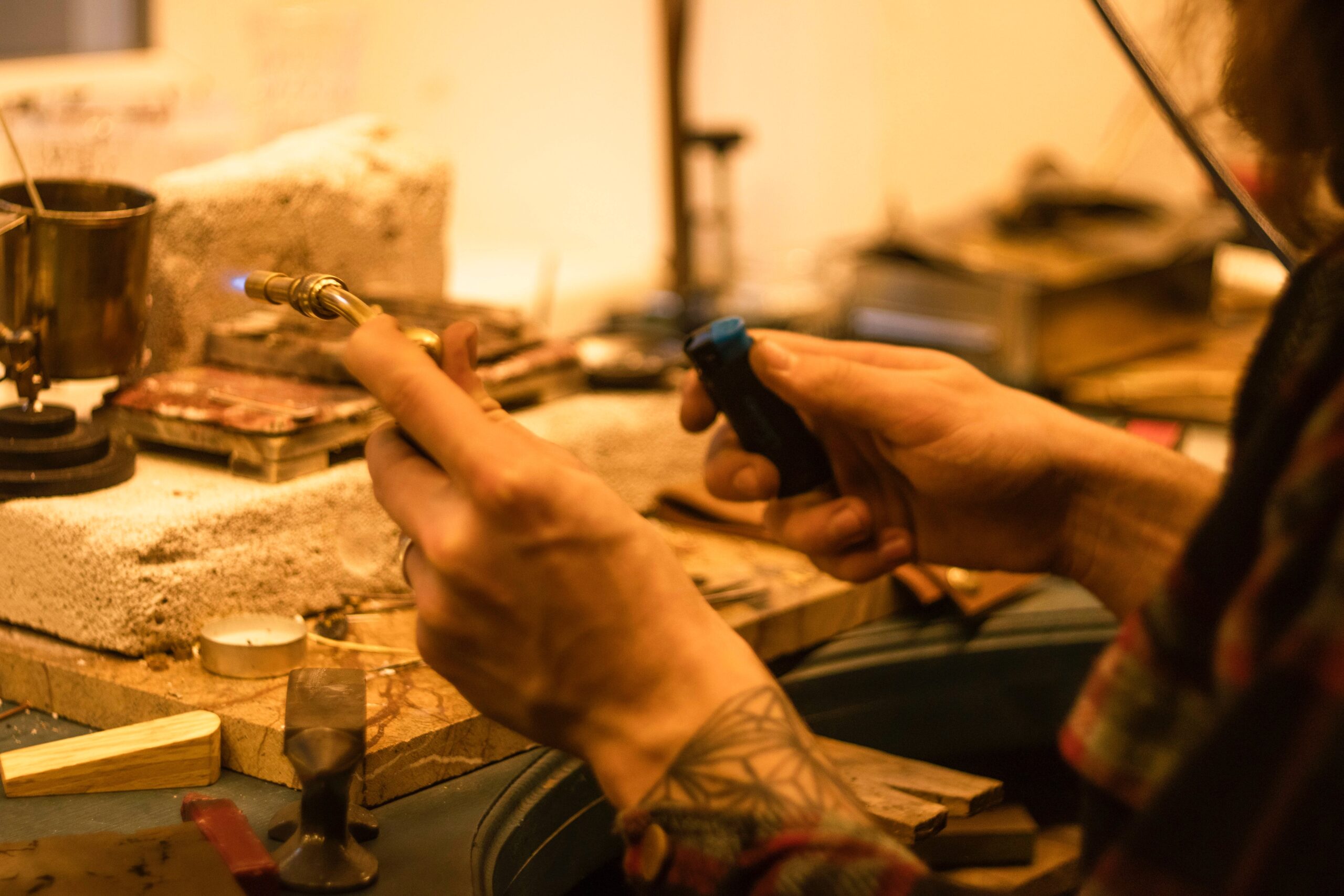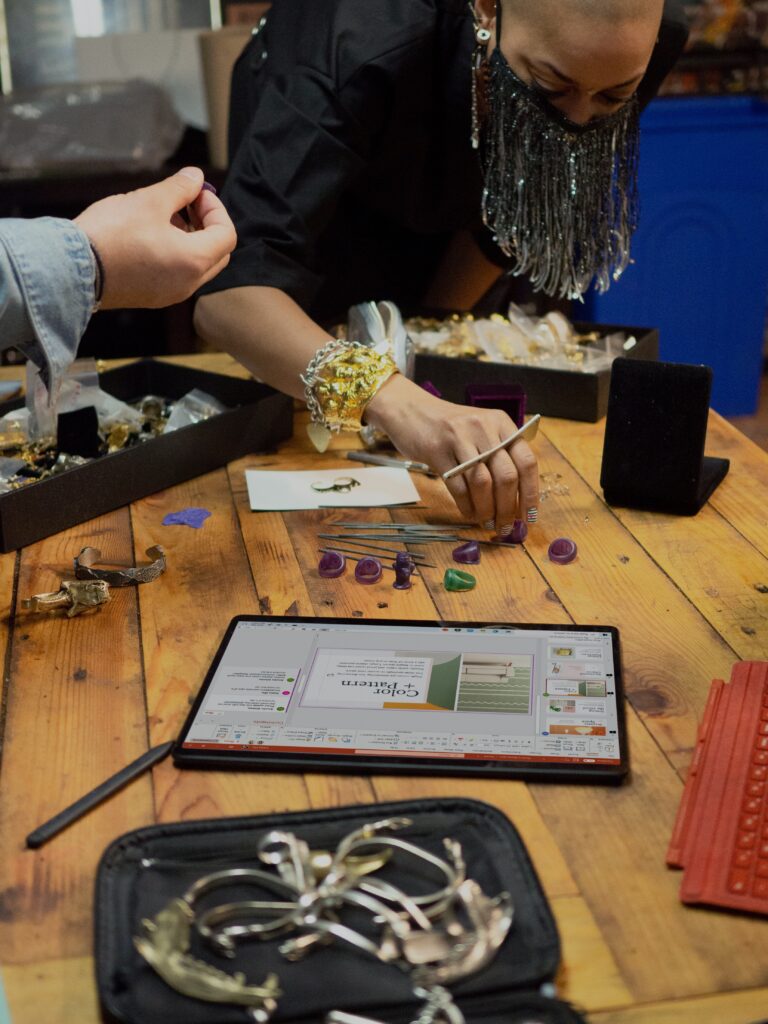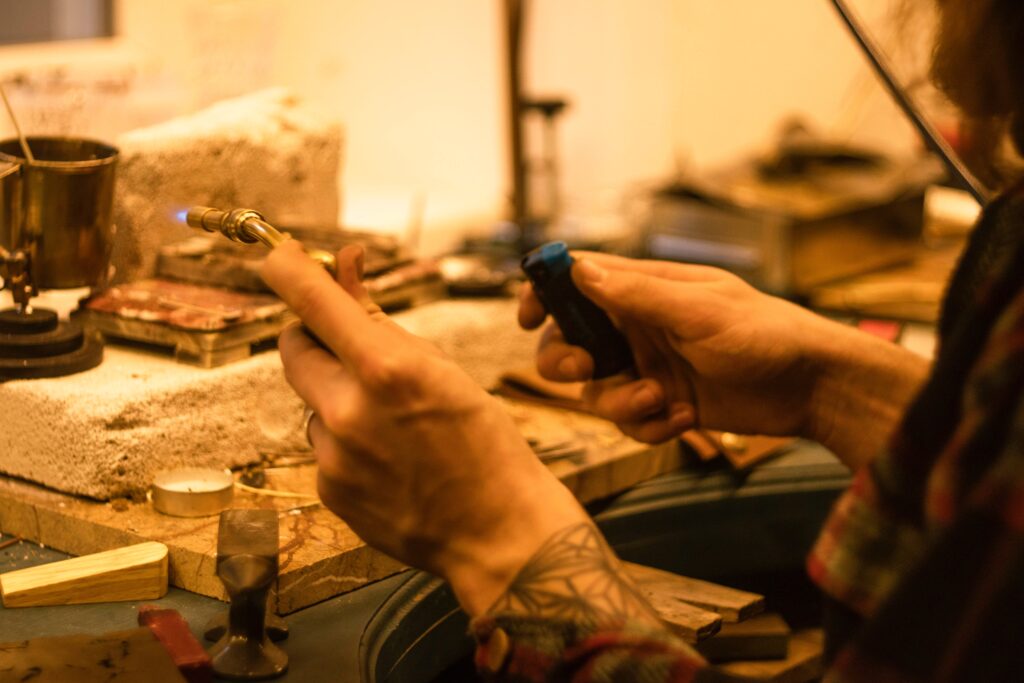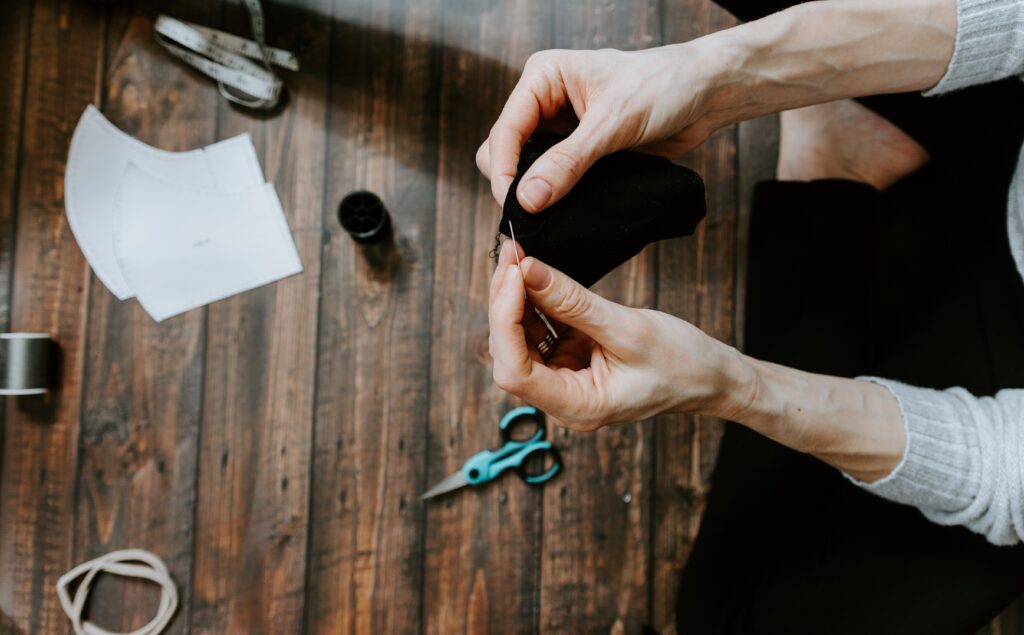
If you’re a budding jewelry enthusiast looking to explore your creativity and learn the art of handmade craftsmanship, you may be wondering if there are any workshops or classes available for you to attend. Luckily, there are a myriad of options out there that can help you elevate your skills and unleash your inner jewelry artist. Whether you’re interested in mastering the art of beading, wire-wrapping, or metalwork, there are numerous classes and workshops tailored to suit your interests and skill level. Joining these workshops can open up a world of possibilities, allowing you to learn from experienced artisans, connect with fellow jewelry enthusiasts, and take your passion for jewelry-making to new heights. So, if you’re eager to embark on a creative journey and immerse yourself in the world of handmade jewelry, read on to discover the exciting array of workshops and classes waiting to be explored.

Check out our TOP three Recommended products
1. Local Jewelry Workshops and Classes
If you’re interested in learning the art of handmade jewelry, there are plenty of options available in your local community. Here are some places where you can find jewelry workshops and classes:
1.1 Community Centers
Many community centers offer various arts and crafts classes, including jewelry making. These workshops are often affordable and suitable for beginners. Community centers are a great option as they provide a welcoming and inclusive environment for individuals of all ages and skill levels.
1.2 Art Schools
Art schools are a fantastic resource for individuals looking to delve deeper into the world of jewelry making. These schools often have specialized jewelry departments and instructors who can provide expert guidance. Art schools offer a structured curriculum that covers a wide range of techniques, allowing you to develop a strong foundation in jewelry making.
1.3 Craft Stores
Craft stores often organize jewelry-making workshops on-site. These workshops are usually focused on specific projects or techniques and are led by experienced instructors. It’s a great opportunity to learn directly from professionals while being surrounded by a vast array of tools and materials.
1.4 Independent Jewelry Trainers
Independent jewelry trainers are skilled artists who offer private or group lessons in their own studios. These trainers often have extensive experience in the field and can provide personalized instruction tailored to your specific interests and skill level. Working with independent trainers allows for a more intimate and flexible learning experience.
2. Online Jewelry Workshops and Courses
If you prefer to learn from the comfort of your own home, online jewelry workshops and courses are a convenient option. Here are some avenues to explore:
2.1 Jewelry Making Websites
Numerous websites offer comprehensive online courses and tutorials. These websites provide detailed step-by-step instructions and videos, allowing you to follow along at your own pace. They often cover a wide range of jewelry-making techniques and cater to both beginners and more experienced artisans.
2.2 Online Craft Platforms
Online craft platforms, such as Etsy or Craftsy, provide a wealth of resources for learning jewelry making. These platforms offer both pre-recorded workshops and live classes where you can interact with instructors and fellow students. Online craft platforms are a great way to connect with a community of like-minded individuals and gain inspiration.
2.3 YouTube Tutorials
YouTube is a treasure trove of free jewelry-making tutorials. Many skilled artisans and instructors share their knowledge through video tutorials, covering various techniques and projects. These tutorials are a great starting point for beginners or those looking to learn specific skills without any financial investment.
2.4 Social Media Groups
Social media platforms, such as Instagram and Facebook, host numerous jewelry-making groups where artists and enthusiasts share their work and techniques. These groups can provide a supportive community and a platform to seek guidance, inspiration, and even participate in virtual workshops or challenges.
Check out our TOP three Recommended products
3. Jewelry Making Retreats and Workshops
For a more immersive and inspiring experience, jewelry making retreats and workshops can be a fantastic option. Here’s what to expect:
3.1 Retreat Locations
Jewelry making retreats are often held in picturesque and serene locations. These retreats provide a peaceful environment that allows you to focus on your craft while enjoying the beauty of nature. Retreat locations can range from cozy cabins in the woods to beachfront properties, offering a tranquil atmosphere to enhance your creativity.
3.2 Guest Instructors
Jewelry making retreats often invite renowned guest instructors who specialize in specific techniques or styles. These instructors bring a wealth of knowledge and expertise, providing valuable insights and guidance during the retreat. Interacting with experienced professionals can take your jewelry-making skills to the next level.
3.3 Workshop Themes
Retreats and workshops usually revolve around specific themes or projects. Whether you’re interested in wire-wrapping, beadwork, metalwork, or any other jewelry-making technique, you can likely find a retreat that focuses on your area of interest. Workshop themes allow you to dive deep into a particular aspect of jewelry making and gain specialized knowledge.
3.4 Schedule and Duration
Jewelry making retreats and workshops vary in duration. Some may span a weekend, while others may last several weeks. The schedule usually includes a mix of instruction, hands-on practice, and leisure time to relax and connect with fellow participants. Retreats offer a unique and immersive experience that allows you to fully immerse yourself in the craft.
4. Universities and Continuing Education Programs
If you’re looking for a more formal and structured approach to learning jewelry making, universities and continuing education programs can provide comprehensive options. Let’s explore:
4.1 Art and Design Departments
Many universities have dedicated art and design departments that offer degree programs and courses in jewelry making. These programs provide a well-rounded education, covering various techniques, design principles, and art history. Pursuing a degree in jewelry making can open doors to professional opportunities and give you a deeper understanding of the craft.
4.2 Continuing Education Departments
Continuing education departments in universities often offer non-degree programs and workshops for individuals interested in learning jewelry making. These programs are designed for both beginners and more advanced learners. They provide a structured curriculum and access to experienced instructors who can guide you through your learning journey.
4.3 Course Offerings
Universities and continuing education programs offer a wide range of course options in jewelry making. From introductory courses to advanced workshops focusing on specific techniques or materials, you can find a course to suit your interests and skill level. These programs often have well-equipped studios and access to a variety of tools and materials.
4.4 Certification/Qualification
Some universities or continuing education programs offer certification or qualification in jewelry making. These credentials can add value to your résumé and demonstrate your commitment to the craft. Certification programs often involve a collection of completed projects and a final evaluation to assess your proficiency in various techniques.

5. Trade Shows and Exhibitions
Trade shows and exhibitions provide a vibrant platform for jewelry enthusiasts and professionals to connect, showcase their work, and learn from industry leaders. Let’s explore the opportunities they offer:
5.1 Exhibitors
Trade shows and exhibitions bring together a diverse range of jewelry makers, from independent artisans to established businesses. Visiting these events allows you to explore a variety of jewelry styles, techniques, and materials. You can gather inspiration from the exhibitors’ work and connect with artists who share your passion.
5.2 Demonstrations and Workshops
Many trade shows and exhibitions feature live demonstrations and workshops conducted by experienced artisans. These hands-on sessions provide a unique opportunity to learn directly from skilled professionals. Demonstrations often showcase specific techniques and allow you to observe the intricate process of creating handmade jewelry.
5.3 Networking Opportunities
Trade shows and exhibitions offer excellent networking opportunities. You can connect with industry professionals, fellow artisans, and suppliers, creating valuable connections within the jewelry-making community. Networking can lead to collaborations, mentorship opportunities, and even potential clients or customers for your own jewelry business.
5.4 Popular Events
Several prestigious trade shows and exhibitions are renowned in the jewelry-making world. Events like the Tucson Gem Show, JCK Las Vegas, and the International Gem & Jewelry Show attract exhibitors and visitors from around the globe. These events provide a bustling atmosphere filled with creativity, innovation, and the latest trends in the industry.
6. Collaboration with Local Artisans
Collaborating with local artisans allows you to expand your skills, knowledge, and network within the jewelry-making community. Here are some avenues to explore:
6.1 Jeweler Associations
Jeweler associations often organize events, workshops, and exhibitions for their members. Joining a local jeweler association can provide opportunities to connect with fellow artisans, participate in collaborative projects, and learn from experienced professionals. These associations often foster a sense of community while promoting the growth and development of jewelry making as an art form.
6.2 Artisan Markets
Artisan markets bring together local artists and craftspeople, including jewelry makers, in one vibrant marketplace. Participating in these markets as a vendor or attendee allows you to engage with fellow artisans, exchange ideas, and learn from each other. Artisan markets often promote a supportive and collaborative environment, making them an ideal platform for networking and skill-sharing.
6.3 Studio Visits
Visiting the studios of local jewelry artisans grants you the opportunity to witness their creative process firsthand. Engaging with artists in their workspaces allows for a deeper understanding of their techniques, materials, and inspiration. Many artisans are open to sharing their knowledge and may even provide you with hands-on experience and guidance.
6.4 Mentoring Programs
Mentoring programs connect experienced jewelry makers with individuals seeking guidance and mentorship. These programs offer personalized instruction and support, allowing you to develop your skills under the guidance of a seasoned professional. Mentoring programs can provide valuable insights, industry knowledge, and constructive feedback to help you refine your craft.
7. Non-profit Organizations and Foundations
Several non-profit organizations and foundations support the arts and crafts community by offering resources, grants, and workshop sponsorship. Here’s how you can benefit:
7.1 Arts and Crafts Foundations
Arts and crafts foundations often provide funding, resources, and educational opportunities to artists and aspiring artisans. These foundations may offer grants specifically for jewelry makers or host workshops and conferences focused on the craft. Utilizing the resources offered by these organizations can enhance your learning journey and provide financial support.
7.2 Jewelry Making Grants
Some organizations offer grants specifically tailored to jewelry makers. These grants can provide financial assistance to help cover the costs of materials, equipment, or education. Applying for jewelry making grants can create opportunities for you to pursue your passion without the financial burden.
7.3 Workshop Sponsorship
Non-profit organizations and foundations sometimes provide sponsorship for jewelry-making workshops. This sponsorship can range from funding for workshop fees to covering the costs of tools and materials. Participating in sponsored workshops allows you to learn from industry professionals without the financial strain.
7.4 Volunteer Opportunities
Volunteering for non-profit organizations and foundations related to the arts and crafts community can be a rewarding experience. By offering your time and skills, you can contribute to the growth and development of the jewelry-making community. Volunteer positions may involve assisting with workshops, events, or mentoring programs, allowing you to gain valuable experience while giving back.
8. Hobby Clubs and Meetup Groups
Joining hobby clubs and meetup groups dedicated to jewelry making can provide a supportive and collaborative environment. Here’s what you can expect:
8.1 Local Hobby Clubs
Local hobby clubs often bring together individuals who share a passion for jewelry making. These clubs provide a space to connect with like-minded individuals, share ideas, and learn from one another. Hobby clubs may organize regular meetings where members can showcase their work, offer feedback, and participate in group projects.
8.2 Online Meetup Platforms
Online meetup platforms, such as Meetup.com, host a variety of jewelry-making groups and events. These platforms allow you to connect with fellow enthusiasts virtually, regardless of your geographical location. Online meetups often include virtual workshops, guest speakers, and opportunities for discussion and collaboration.
8.3 Special Interest Groups
Special interest groups cater to specific aspects of jewelry making, such as wire-wrapping, beadwork, or metalwork. Joining these groups can provide a more focused learning environment centered around your area of interest. Special interest groups often share resources, tutorials, and host dedicated workshops or challenges.
8.4 Group Activities and Projects
Hobby clubs and meetup groups often engage in group activities and projects. These activities can range from jewelry-making challenges to collaborative projects where members contribute their skills to create a collective piece. Engaging in group activities and projects fosters a sense of community and allows for skill-sharing and inspiration.
9. Private Lessons and Instructors
Private lessons offer a personalized and tailored learning experience to help you hone your jewelry-making skills. Consider the following options:
9.1 Professional Jewelry Artists
Professional jewelry artists may offer private lessons or mentorship programs. Engaging with a professional on a one-on-one basis allows for focused instruction and guidance. Professional artists often have their own studios equipped with specialized tools and materials, providing an immersive learning environment.
9.2 Individual Instructors
Individual instructors who specialize in jewelry making can provide private lessons in their own studios or even remotely through video calls. These instructors typically have extensive experience in the field and can cater to your specific interests and skill level. Private lessons offer flexibility in scheduling and allow for a personalized learning experience.
9.3 Lesson Types
Private lessons can cover a wide range of jewelry-making techniques. Whether you want to learn traditional metalwork, enameling, or contemporary wire-wrapping, individual instructors can tailor lessons to your desired skill set. Beginner lessons focus on foundational skills, while more advanced lessons delve into complex techniques and design principles.
9.4 Customization Options
Private lessons offer the advantage of customization. Instructors can adapt the curriculum and pace to align with your learning style and goals. Moreover, they can provide feedback and suggestions specific to your projects, helping you refine your techniques and design concepts. Customization allows for a more efficient and targeted learning experience.
10. Home-Based Jewelry Workshops
If you prefer the comfort and convenience of learning at home, setting up a DIY jewelry workshop can be a fulfilling option. Consider the following aspects:
10.1 Setting Up a DIY Workshop
Designate a space in your home to serve as your jewelry-making workshop. This can be a spare room, a corner of your living room, or even a spacious table. Ensure you have sufficient lighting, ventilation, and storage for your tools and materials. Setting up a dedicated space creates a conducive environment for creativity and learning.
10.2 Safety Considerations
Safety should be a top priority when setting up a home-based jewelry workshop. Invest in the appropriate safety equipment, such as goggles, gloves, and a fire extinguisher. Familiarize yourself with proper handling techniques for tools and materials, and follow safety guidelines. Ensuring a safe working environment allows you to focus on your craft without unnecessary risks.
10.3 Tools and Equipment
Equip your home-based jewelry workshop with essential tools and equipment. Start with the basics like pliers, wire cutters, and round-nose pliers. Gradually expand your collection as you progress and experiment with different techniques. Investing in quality tools ensures precision and durability, enhancing your jewelry-making experience.
10.4 Materials and Supplies
Stock up on a variety of materials and supplies to facilitate your jewelry-making projects. Choose a range of beads, gemstones, findings, and wires that align with your design preferences. Consider experimenting with different materials to explore new techniques and styles. Having a well-stocked inventory ensures you have the freedom to create a diverse range of jewelry pieces.
In conclusion, there are numerous avenues available for attending handmade jewelry workshops and classes. From community centers and art schools to retreats, online platforms, and collaboration with local artisans, the options are extensive. Whether you prefer in-person instruction, virtual learning, or a combination of both, the jewelry-making community offers opportunities for every skill level and interest. So, embrace your creativity, find the avenue that suits you best, and embark on a journey of self-expression through the art of jewelry making.
